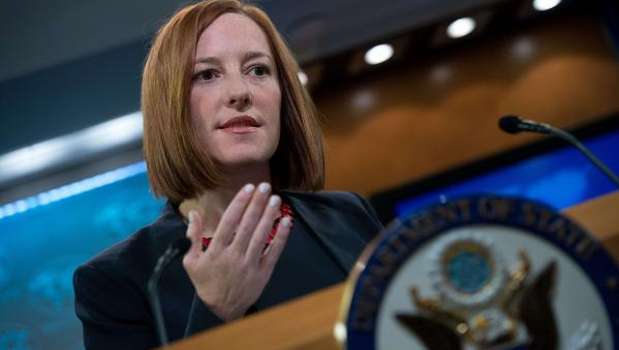
US State Department spokeswoman Jen Psaki speaks at the daily briefing at the State Department in Washington, DC on March 10, 2014. (AFP Photo/Nicholas Kamm)
Washington, Reuters—The United States held out the possibility on Monday that the US and Russian foreign ministers could meet this week about Ukraine but said it needed to know Moscow would engage seriously on a diplomatic solution.
Russia’s bloodless seizure of the Crimea region of Ukraine has brought US–Russian relations to one of their lowest points since the Cold War, with the United States searching for a way to keep Russia from annexing Crimea and its Russian naval base.
The State Department said Secretary of State John Kerry told Russian Foreign Minister Sergei Lavrov on Saturday that Washington wanted Moscow to cease its military advances in Ukraine, stop its drive to annex Crimea and end “provocative steps.”
“The United States needs to see concrete evidence that Russia is prepared to engage on the diplomatic proposals we have made to facilitate direct dialogue between Ukraine and Russia and to use international mechanisms like a contact group to de-escalate the conflict,” State Department spokeswoman Jen Psaki said in a written statement.
“Kerry made clear to Foreign Minister Lavrov that he would welcome further discussions focused on how to de-escalate the crisis in Ukraine if and when we see concrete evidence that Russia is prepared to engage on these proposals,” she added.
Separately, Psaki told reporters it was conceivable Kerry might meet Lavrov before a planned referendum on Sunday within Crimea on whether to join Russia, but he first wanted to ensure that Moscow would work seriously on a diplomatic solution.
Unidentified armed men fired in the air as they moved into a Ukrainian naval post in Crimea on Monday in the latest confrontation since Russian military groups seized control of the Black Sea peninsula.
A US official said Kerry had given Lavrov a one-page paper in Europe last week that laid the proposals out, including the idea of a “contact group” to bring Russia, Ukraine and several other nations together to try to forge a diplomatic solution.
The official, who spoke on condition of anonymity, said Lavrov appeared to have been instructed not to engage seriously with Kerry on the issue.
On Friday, Lavrov invited Kerry to meet Russian President Vladimir Putin in Sochi on Monday, the US official said, but the US secretary of state declined in a telephone call with the Russian foreign minister on Saturday.
The official said Kerry had been reluctant to go because Lavrov had so far been unwilling to discuss the substance of a diplomatic solution and because Russia had continued to take steps that, in the US view, aggravated the situation.
Those included the continued flow of Russian troops and materiel into Crimea, Russia’s support for Sunday’s referendum in Crimea on whether to join Russia, and suggestions in the Russian Duma, or lower house of parliament, that it would take up legislation to annex Crimea.
The official said that after Saturday’s conversation, the United States had given Lavrov a series of questions asking whether Russia was willing to take steps to de-escalate the crisis, to stop its military advance, to cease steps in the Duma toward annexing Crimea.
The questions also asked about Russia’s willingness to take part in a contact group to work through issues such as whether Russian troops in Crimea would go back to their barracks, deploying international monitors to replace them.
The United States has yet to receive a response to those questions, which took up about a page and a half of paper.
“The point is we’re not going to just walk into something where they are just going to say, ‘No, no, no, no, no,’ to everything and we have traveled all the way there,” a second US official said.
“We’re not going to just go there and be rolled.”
Last week, Putin’s spokesman ridiculed proposals for an international contact group, saying they “make us smile.”
Many Western nations have denounced the referendum as illegitimate, saying Ukraine’s constitution calls for such votes to be held nationwide rather than within individual regions.
White House spokesman Jay Carney kept up the criticism.
“We are long past the days when borders can be redrawn over the heads of elected governments,” he said.
He also hinted the United States, which on Thursday ordered sanctions including travel bans and the freezing of US assets on people responsible for Russia’s intervention in Crimea, might impose more sanctions depending on the outcome of the referendum.
Separately, US President Barack Obama began a new week of diplomatic consultations on Ukraine with a phone call on Sunday to Chinese President Xi Jinping that focused on a peaceful solution to Russia’s military intervention.
A White House statement released on Monday gave little detail as to what was discussed, saying the two agreed on the “importance of upholding principles of sovereignty and territorial integrity, both in the context of Ukraine and also for the broader functioning of the international system.”
Obama also phoned Spain’s Prime Minister Mariano Rajoy and Kazakh President Nursultan Nazarbayev, the White House said.
